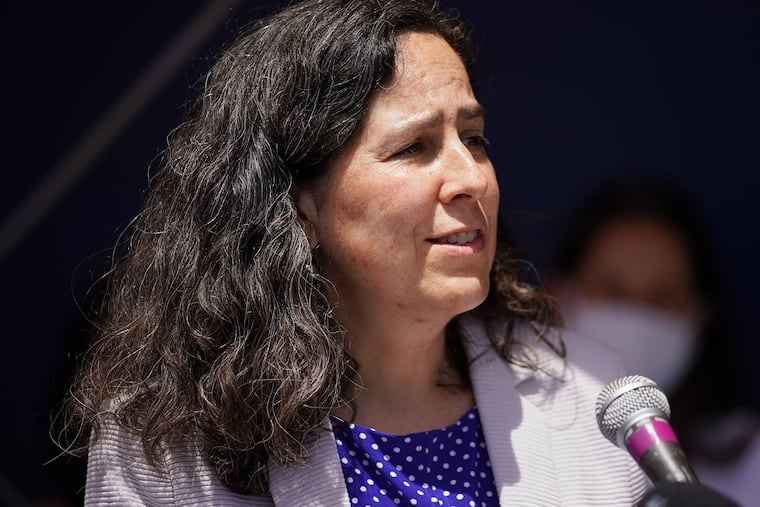Philadelphia names Cheryl Bettigole as new health commissioner
Cheryl Bettigole replaces former health commissioner Thomas Farley, who resigned after his role in ordering the cremation of remains of MOVE victims was made public.

Cheryl Bettigole has been named Philadelphia’s new health commissioner after holding the position on an interim basis since May.
She replaces former health commissioner Thomas Farley, who resigned after his role in ordering the cremation of remains of MOVE victims was made public.
“Throughout her entire career, Dr. Bettigole has demonstrated a deep commitment to prioritizing equity, access, and prevention in public health,” said Mayor Jim Kenney in a statement announcing Bettigole’s appointment Thursday.
Bettigole, a primary care doctor and longtime public servant in the health department, said she wanted to use her experience working in the city’s community clinics to improve access to primary care and address the racial health disparities on display during the pandemic. She said her priorities would also include addressing gun violence, developing an emergency preparedness plan that emphasizes equity, and investigating the city’s handling of MOVE victim remains.
Racial inequity underpins many of the city’s greatest health challenges, such as gun violence, chronic health conditions like diabetes and kidney disease, and COVID-19, she said. The health department is in the process of hiring a chief racial equity officer and developing a statement on racism as a public health problem.
Improving access to primary care and strengthening trust in Black and Hispanic communities are important first steps to addressing many of these public health problems, she said.
“How are we doing to make sure that people who need those resources are getting them?” she said. “I think we all saw how that didn’t work [during the pandemic] and I think the question is how do we get that to work better.”
» READ MORE: Philadelphia drug deaths soared again in 2020, hitting Black residents hardest: ‘It’s a racial justice issue’
To address Philadelphia’s rising overdose death toll, Bettigole said the health department is planning to distribute test strips for fentanyl, a powerful narcotic that has contributed to the overdose rate because many people do not realize it is mixed into many street drugs.
Bettigole will need to balance her public health wish list with two major challenges: guiding the city through the remainder of the COVID-19 pandemic and rebuilding trust after fallout from the MOVE controversy.
After the controversy over the MOVE remains, which led to Farley’s resignation in May, Kenney commissioned an independent investigation and also said the city would begin reviewing and reforming policies in the Medical Examiner’s Office. Bettigole said Thursday that the investigation is ongoing and the city is looking for a new medical examiner. But further changes to the Medical Examiner’s Office are on hold until the investigation is over, she said.
» READ MORE: Questions persist over Philly’s mishandling of MOVE remains
The department also attracted national attention this year over its failed partnership with Philly Fighting COVID, a self-described group of college kids that hosted a mass vaccination site at the Pennsylvania Convention Center. The deputy health commissioner resigned amid that scandal in January.
Kenney has largely deferred to his health department throughout the pandemic, giving Bettigole a powerful role in determining policies such as mask and vaccine mandates. She oversaw the lifting of all coronavirus restrictions in June, and then instituted a mask mandate in August amid a surge in new cases. That mandate remains in place, making Philadelphia more restrictive in its approach to the pandemic than surrounding counties.
Bettigole has also led the city’s implementation of vaccine mandates for employees of health-care and higher education institutions. But unlike several other large cities, Philadelphia has no vaccine requirement for city employees. Bettigole has instead stood by requiring unvaccinated employees to double mask.
Bettigole was selected for the position after a national search for a new commissioner by DSS, a minority-led international search firm. The city declined to comment on how many candidates were seriously considered, but a total of 877 were screened, said city spokesperson Sarah Peterson.
Ala Stanford, founder of the Black Doctors COVID-19 Consortium, had expressed interest in the job but said Sunday that she had withdrawn her name from consideration and would instead focus her efforts on the health clinic that her organization opened this week.
City Councilmember Cindy Bass, who has been critical of the city’s handling of vaccine distribution and had publicly called for Stanford to get the job, said Thursday she remains skeptical of the health department’s ability to address racial inequity.
“Dr. Bettigole may have the very best of intentions, but I do think that there are a number of qualified, ready-to-serve physicians of color ... who also have the best of intentions and who also have a level of understanding and background that I don’t know that Dr. Bettigole has,” she said.
Councilmember Jamie Gauthier, meanwhile, said she had had a good working relationship with Bettigole since May and was pleased to learn of her appointment.
“We deeply appreciate the work and attention she’s devoted to gun violence, and in particular her efforts to utilize a public health approach to address this crisis,” Gauthier said. “Her focus on achieving racial equity in our city’s health-care system is urgent and admirable, and I’m confident that she will work diligently to carry out this mission.”
Bettigole said she decided to apply for the job, which comes with a $190,000 salary, after long conversations with trusted confidants. Public health officials have faced a wave of attacks and threats from people angry about how they are handling the pandemic.
Bettigole said she has also experienced these types of attacks.
“I do not know why people feel so free to spew hate at people who are trying to make things better,” she said. “I had to think a lot about this. It’s a tough job. It’s also a chance to get things done, and it’s an opportunity to make a difference — that’s hard to turn down.”